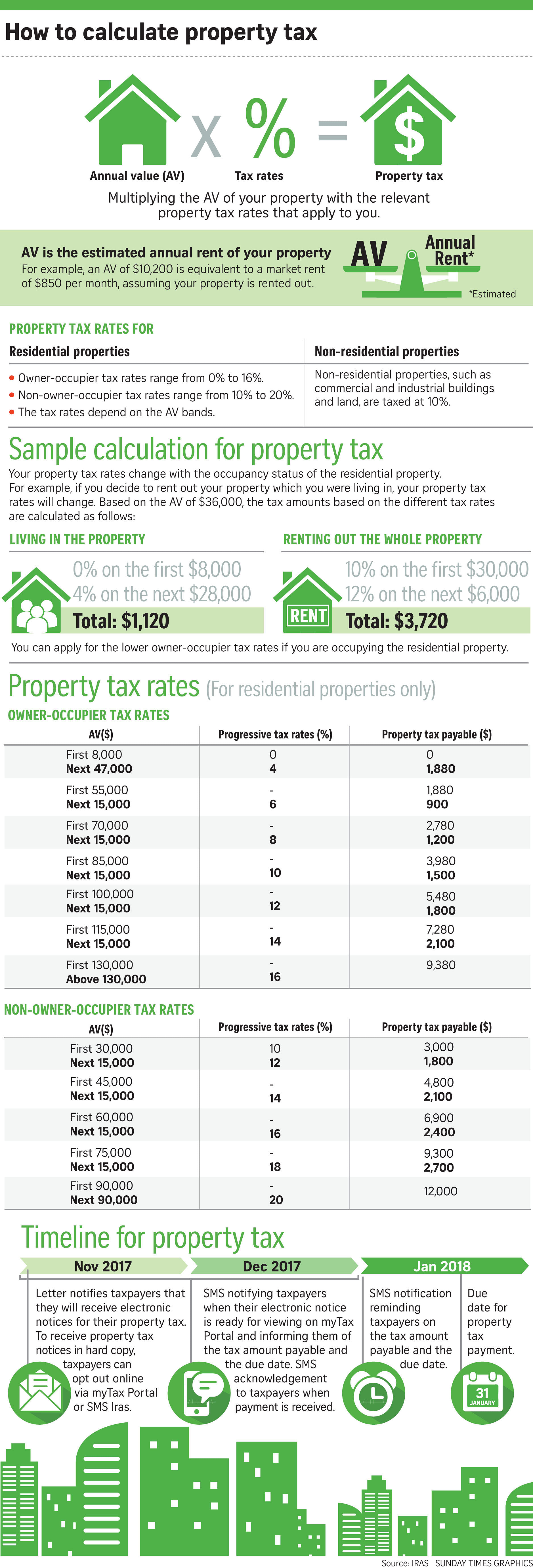The taxman wants home owners to go green by choosing to receive electronic notices for their property tax instead of paper notices.
Around 500,000 home owners will be given the choice to receive an e-property tax bill.
If you are among them, expect to be notified by the Inland Revenue Authority Of Singapore (Iras) by letter early next month. However, you can also opt out by following the instructions in the letter.
"When property owners choose to go electronic, they will receive an SMS to notify them when their electronic notice is ready for viewing," Iras said.
"Taxpayers may log into myTax Portal using the link provided in the SMS. For greater convenience, the SMS will also inform the property owners of the tax amount payable and the due date."
To receive these alerts, make sure that Iras has your mobile phone number. You can update your contact details at mytax.iras.gov.sg
Q Will all property owners receive electronic property tax notices?
A For a start, more than half a million residential property owners will receive electronic instead of paper notices in the first phase starting at the end of this year.
Q How was this first batch of property owners selected for the electronic property tax notices?
A This group comprises individuals who own residential properties, have been receiving property tax notices for their residential properties and have provided their mobile phone numbers to Iras.
Q What about other property owners?
A The taxman will gradually extend the benefits of electronic property tax notices to other property owners.
However, Iras recognises that not all taxpayers may be ready for such digital services, and they would have the option to receive paper notices.
Q Why do away with hard-copy notices?
A The widespread use of computers and mobile devices suggests that many taxpayers are ready to receive electronic tax notices. These electronic notices give taxpayers greater convenience, security and timeliness of alerts.
• Convenient: Taxpayers can access the e-property tax bills any time and anywhere.
• Secure: Only the intended recipient can access his or her e-property tax bill on myTax Portal with SingPass 2FA, removing concerns of lost mail or unintentional information disclosure.
• Timely: Timely notifications are provided to taxpayers when the e-property tax bills are available on myTax Portal.
-
Public feedback helps improve Iras services
-
Most of us may not be aware that the taxman seeks public feedback and initiates consultation regularly to improve services.
The Taxpayer Feedback Panel (TFP) set up in 1999 aims to get views on existing systems, processes and services, as well as suggestions to initiate new services.
The panel, which meets four times a year, comprises 24 representative members of a wide spectrum of local businesses, industries and trade associations. Each member serves a two-year term and a chairman is appointed.
Iras has taken suggestions from the panel and has made enhancements to its processes and services. For instance, the enhanced property tax bill is one of many initiatives on which Iras sought feedback before launching.
In 2012, it combined annual value changes into a single property tax bill for all residential properties for greater clarity and convenience. The contents of the bill were customised according to the profile of the property (annual value and applicable tax rate), a bigger font size was adopted and simpler language was used.
The enhanced hardcopy property tax bill has now evolved into an e-property option.
At the recent TFP appointment and appreciation ceremony 2017, Iras commissioner and chief executive Tan Tee How expressed his gratitude to all TFP members: "We have shared many of these initiatives with TFP and done demonstrations of some of these initiatives which, enabled by digital technologies, lower compliance cost for taxpayers and lead to better efficiency for the tax industry."
Lorna Tan
Q How will Iras communicate the move to electronic notices to property owners?
A Iras will be sending hard-copy notification letters by early next month to the first group of property owners selected to receive electronic notices.
If they wish to receive hard-copy property tax bills instead, they can choose to opt out online via myTax Portal or SMS or by contacting Iras. These opt-out instructions will also be provided in the notification letters and on the Iras website.
Q How is the annual value of buildings determined?
A The annual value of buildings is the estimated gross annual rent of the property if it were to be rented out, excluding furniture, furnishings and maintenance fees. It is determined based on estimated market rentals of similar or comparable properties and not on the actual rental income received.
The way the annual value is determined is the same regardless of whether the property is owner-occupied, vacant or rented out.
The property tax payable is derived by subsequently applying the relevant tax rate on the annual value. Owner-occupiers pay less tax than non-owner-occupiers.
Every year, the taxman reviews the annual value of properties to reflect the changes in the market rental values of comparable properties. The annual value will be amended if the latest market rent data no longer supports your existing annual value.
If your property undergoes physical change that could materially affect its rental value, Iras will also revise your annual value from the date of change.
SEE INVEST



